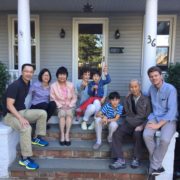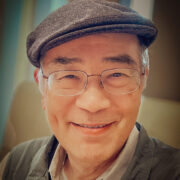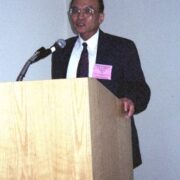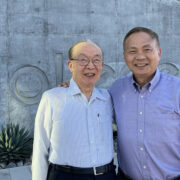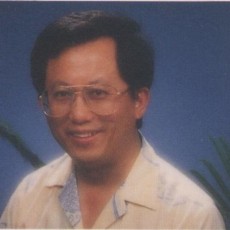Blessings in Disguise
Accepting Reality, Thinking Positive, and Creating Opportunities
Author: Yushu (Lucy) Yang 楊毓淑
It’s said that our destiny is laid out for us in the dark. My life has not been the road that I planned – fate would have me walk another road. Yet this road has turned out especially smooth – could it have been a blessing in disguise? I have come to realize the truth of a principle that we must always think positively and not always complain, calmly facing whatever comes. Since we cannot change our fate, we must search for opportunities amidst our present situation, hold on to those opportunities tightly, and even create new ones. As long as you are committed, there is potential for success in any career.
I do not have extraordinary family history, nor do I have any noteworthy academic and professional career. As someone who has worked half their life as a first-generation immigrant, it is satisfactory to be able to retire as a professional nursing administrator and enjoy decent retirement savings and social security, plus the matching ¼ 403b plan from the hospital and my tax deferred 401k account. My husband has his own retirement savings, and our children have all set up families and careers. We can live a carefree retirement life – that is enough in itself.
I grew up in Hsinchu province, Dashanbei 大山背village in Hengshan 橫山 township; it was a gorgeous mountain area with luscious waters. This is also the hometown of famous comic artist Hsingchin Liu 劉興欽. My elementary school has long since been closed; those children who grew up on the mountain all went to the cities for work or business, and those who moved into Dashanbei all renovated the homes to serve as vacation houses. My father could wield both pen and sword; he served as a civil servant in the construction office of Jiuzantou 九讚頭township, and when he got off work he worked on the farm. He was once the village representative. My mother was adept at working the fields; as my father was at work all day it was she who managed the farmers and tea gardens. She was also a midwife (she had been trained during the Japanese occupation and helped women in remote areas give birth) – you can imagine how busy she was. She was once chosen as a model mother and model woman. By countryside standards, we were quite a well-off household. When I graduated from elementary school, I tested into Chutung High School 竹東中學 – it was tough having to commute to and from the mountain every day.
Graduated from middle school, I did not dare to go against my father’s wishes to take the entrance test for Hsinchu Girl’s High School, so instead I accepted my guaranteed admission into Hsinchu Teacher’s High School as a “replacement qualifier” (the top graduating boy had declined the offer to instead go to Hsinchu High School). As such I had accepted my fate to return to the countryside and help my mother pick tea and cook meals. However, summer vacation was soon over, and while some classmates went off to Hsinchu Girl’s High to register and others reported to the teacher’s or vocational high schools. I never received a registration notice from Hsinchu Teacher’s High School! I hurried down the mountain to speak to the dean, who said unexpectedly that the guaranteed admission policy had changed – the graduate with the second-best grades could no longer be a replacement qualifier. Then he said, “You don’t need to test into another school, we’ll ensure you can go directly to high school!” This was the first time in my life that my fate backfired.
My father was disappointed and angry about this turn of events. Yet I not only accepted this new reality but was also secretly pleased, for I would have the opportunity to go to college.
I studied for one year at Chudong High School, then took the transfer exam for Hsinchu Girl’s High. In middle school I had excelled at math and sciences, while I struggled with history and geography because I didn’t like to memorize dates, names, and places. I recall in middle school before history or geography tests, I often clutched the buddha’s feet for luck and crammed for the test so I could pass. One time though, there was an unannounced test in geography in which we had to fill in the station names along a long train line (I don’t remember the name) in China. I got 29% right. When the teacher returned my tests she said, “Yushu Yang, if you ever go travel, you will certainly get lost.” Sure enough, my teacher was right. My great weakness is that I have no sense of direction. When I go out, I often can’t distinguish north from south. When taking the standardized university examination, I hoped my math and science marks would remedy those of history and geography so I could get into my top choice school, National Taiwan Normal University Home Economics Department. On the one hand I would be able to satisfy my father’s expectations, while on the other I could still manage to attain my ideal of teaching home economics in high schools – this was a relaxed job that would also satisfy my interests in home economics and art. Yet that year (1961), the mathematics questions on the university entrance exam were strange and unusually difficult, inciting much criticism and discussion. The reports said that many students got 0 points. Of course, under this condition I could not test into my first choice school, but instead got into National Taipei University of Nursing and Health Sciences. This was the second time my fate backfired.
I originally planned to attend for one year and then retest, but found I was very interested in my first-year courses. Thus, I forgot about the notion of retesting. My grades from nursing coursework and from interning in my third year were all very good; in 1964, I graduated on the top of the class with four jobs to choose from: Taipei Veterans’ General Hospital, National Taiwan University Neurology Department, teaching at Hsinchu Girl’s High, or staying at the college as a teaching assistant. Influenced by my father’s respect for teachers, I choose to stay and be a teaching assistant. I was assigned to guide interns at Taipei Veterans’ General Hospital.
The period from 1964 to 1969 was the most memorable working experience of my life. I benefited a lot from my time at Taipei Veterans’ General Hospital. I checked up on the rooms together with the doctors every day, and learned a lot of medical knowledge listening in on the lectures professional doctors gave to the interns about X-rays, diagnosis, and treatment, etc. I became friends with the head nurse and nurses of every clinic, for I had to connect with them about the supervision and planning of the intern program – to ensure they would treat the interns well and guide them to the best of their ability, it was essential I build rapport and maintain good relationships. The only problem was there were many young nurses at Taipei Veteran’s General Hospital, so my monthly expenditures on weddings and gifts were quite high.
Many of my classmates went abroad, a move to which I was entirely indifferent. In 1968, I met my husband, who was quite a bit older than I, a graduate of National Taiwan University Department of Hydraulic Engineering. He had served at the US Military Industry Bureau, passed the college entrance exam, and now worked as a supervisor at the Pingtung general factory of Taiwan Sugar Corp. He was assigned on a three month business trip to Hawaii to oversee operations at Brewer and Company Sugar Corporation. I thought he surely wouldn’t want to study abroad. But I didn’t ask and just blindly forged ahead and got engaged with him. It was only after our engagement that he told me he had a scholarship from UC Davis, and a good score on the TOEFL to boot; soon he would go study abroad. I was shocked he did not tell me before our engagement and blamed him for concealing this information from me for fear I would not want to go abroad and break up with him.
That my husband was only now going abroad at his age was because my mother-in-law had very conservative ideas; she believed that one should not move far from one’s parents, and felt that as their family did not lack money, what was the point of toughing it out in the United States? When my husband finished his business in Hawaii, he went to travel in California for a few weeks. Seeing the vastness of the world outside, and persuaded by his classmates, he turned his back on his mother’s wishes and resolutely planned to go abroad. My husband’s decision was a verdict that I had to give up my wish for a stable life at home. We got married first, and once I was pregnant, in 1969 my husband went to California to pursue a higher degree. This was the third time my fate backfired on my plans.
I soon received an employment offer from a hospital in New York and could apply for a working visa. In New York, before I received a certificate as a registered professional nurse (or RN, equivalent to Taiwan’s 護理師 hulishi), I could take the hospital’s signature and acceptance letter to apply for a temporary license of one year; after one year I could extend for another year. But in California, if you had no license you could not serve as an RN. With my husband in California, I gave up the employment opportunity in New York and remained in Taiwan until I gave birth. If I could not be an RN, I was afraid bringing a child to the US would influence my husband’s studies. I taught for one semester in my husband’s hometown at Meiho University (美和科技大學), and in 1970 I came to California as a nursing assistant, helping my husband complete his studies earlier. In those years, Taiwan’s economy was not yet soaring – unlike today’s exchange students, back then we could not expect financial help from our families. Thus, most students from Taiwan had to work part time while studying. My husband was fortunate to rely on his savings from working in Taiwan for the first semester, and once I came and worked in the US he did not need to work either. He completed his masters in Civil Engineering in one and a half years.
My son was only 8-months old when I came to the US. Like many new immigrants, we left our son in Taiwan for my mother, along with my two unmarried younger sisters, to take care of. I was torn to leave him, but it was the best option. In Taiwan he would receive good care, while if I took him to a land where I was a stranger, I would not feel at ease finding a nanny for him. While I was working as an nursing assistant I also prepared to take the test for registered nursing license. I worked night shifts at an elite private care facility near UC Davis campus (built for the elderly, and mentally and physically disabled people). Many of the assistant nurses there were Mexicans. They chatted, read magazines, and even slept on their shifts. They were indifferent to patients calls on their help buttons. Because of my professional nursing background, I couldn’t just sit by and watch; all night I responded to patient calls, running exhausted to and from patients. Worse yet, one Mexican nursing assistant sat by idly and when her patient had an incident she called me to take care of it. I said, “I’m sorry, I have responded to your patient’s calls several times already, this time it’s up to you.” I thought at the time of the note I had received at a temple before going abroad; the second line on the note was “a tiger falls finds itself on flat ground and is bullied by dogs” (虎落平陽被犬欺). I did not buy it – I was strong and would not let others bully me.
The old nurse in the managing department didn’t care about anything. She didn’t check on the rooms and slept on her shift. Moreover, she often gave me unfair work assignments. I collected evidence and one day I went to see the head of the nursing department and vice president of the hospital. The next day, he fired the managing nurse. From then on, my colleagues didn’t dare mess with me. One day a white assistant nurse who was usually kind to me saw my prep book for the RN license exam, and she told the other colleagues that they must treat me well, for once I got my license, I would be their superior. In the US, if you have strength, you will have confidence; if you have a just cause, you must fight according to reason.
I took the state board exam in June 1971, the same year my husband got his master’s degree. Fearing the eventuality I didn’t pass the test, I continued serving as a nursing assistant. So as soon as I finished the test I resolutely moved to New York. I temporarily lived at a friend’s home in Forest Hills and looked for work nearby. I started working on July 1. I applied to four hospitals, including Manhattan University Hospital on Long Island, and they all wanted me to start as an RN immediately. I chose Forest Hills Hospital (it was then called La Guardia Hospital, bought by North Shore University Hospital in 1995). Later, North Shore University Hospital merged with Long Island Jewish Hospital, becoming the North Shore / Long Island Jewish Health System (now called North Well Health System) – Forest Hills Hospital became one of the 20 Hospitals in this system. Forest Hills was a good district with convenient transportation – my husband also soon found work. One month later, I found out I had passed the California State Board exam. California and New York had identical employment standards, so I immediately applied for a formal license, and two months later, we welcomed our son, now almost two-years-old, to the US. The time that followed was smooth sailing. I am grateful for how fate has arranged thing, taking a circuitous route that taught me nursing. I did not pursue higher studies since coming to the US, but have stuck with my profession and decent wage jobs.
RNs are well respected in the US. One year, there was a shortage of RNs and a lot of hospitals gave the nursing assistants special training to promote them to technicians or nursing associates, so they could take on some of the burden of the less-skilled work. The patients reacted very poorly and lost confidence in the hospital. When nursing staff approached them, they would ask, “Are you an RN?” forcing the hospital to enlarge the letters “RN” on employee name tags to console the patients. In Taiwan though, conditions for nurses never improved. Besides inadequate salaries, they also do not receive respect. I often saw disrespectful slurs for nurses like “little nurse” (小護士) in Chinese language newspapers or websites – this shows how pervasive the disrespect is.
I visited Taiwan in April this year and had a dinner with 16 of my classmates in Taipei. At the gathering, I suggested to the Chairman of the Taiwan Nursing Association Meihsiu Lu 盧美秀 that the Taiwanese media and general public should better understand nurses’ educational qualifications, knowledge base, contributions towards patient recovery and health, and important role of educating patients (providing knowledge on preventative measures and good health etc.). The government should not only increase nurses’ salaries and improve working conditions, but more crucially, they should respect the nursing profession. Imagine yourself or your friends in the hospital, relying on the doctor’s diagnoses, medicines, and operations – without the professional knowledge of nurses coming to check on the status of your illness, abnormal physical phenomena, mental health, nutritional state, or need for social work, without their timely care, contact with doctors and other medical professionals – patients would never be sure of a speedy recovery. Nurses not only draw up comprehensive care plans for every patient and guide nursing assistants to give the best possible care, but also must understand and cooperate with the doctors’ treatment plans and frequently make reports on the status of illness.
I was there when Taiwan advocated for changing nurses title from 護士 hushi to 護理師 hulishi. Our nursing elders sighed, “How come doctors (醫師), lawyers (律師), accountants (會計師), engineers (工程師), beauticians (美容師), fashion designers (服裝設計師), barbers (理髮師), chefs (廚師), and so on, all use the honorific character師 shi but nurses (護士 hushi) do not?” Thus, the title of “護理師 hulishi” was formally adopted. Those who had college education or above and had a nursing license took on this title. However, after all these years there is still much language minimizing nurses in Taiwanese society. I wanted to take this opportunity to express my opinion.
In my first year in the nursing profession in Taipei, I took an English class learning medical terminology. When I came to the US and started working in the Western workplace, my English was passable enough. But in my daily life (when not talking about medical terms) my English was still quite poor and I almost had a very embarrassing incident. On my first day as an RN, a patient had just returned to her ward from the surgical recovery room. Her daughter asked me, “Can my mother have some life savers?” I did not know what life savers were, but thought if I asked her, she would lose trust in me. I thought something used for saving lives must be something edible rather than something used otherwise – perhaps something like Rendan 仁丹, the mouth freshener lozenges that elderly Taiwanese elderly liked to put under their tongues? Fortunately, I had a contingency plan and told her I had to look at her medical history to see what kind of foods I could give; I saw the doctor’s prescription of “nothing by mouth,” thereby averting the crisis. I asked my colleague about it later, and she responded in surprise, “Lucy, you don’t know what life savers are?” It turned out they were a kind of mint candy. I really wanted to ask her, well, do you know what Rendan are?
My daughter was born in 1973 and I took a leave for half a year. My mother also came to help for two years. When she returned to Taiwan, we were fortunate to find a very good live-in nanny. Her husband was a respected person in Taiwan – for the sake of her kids she came to the US all alone to work for citizenship. She was very responsible and we treated her as a member of our own family. She was a devout Catholic, and every Sunday my husband drove her to church, which she was very grateful for. Seven years later our child was grown up and she had one of her own. After she left she still often helped me out. When I invited people over, she would come help cook. In 1998 I had a surgery and chemotherapy for sigmoid colon cancer – she cooked good food for me every day which my husband would pick up after work. I am so grateful to her – she says that when you treat people well, they will repay you in kind.
After working for five years, I was promoted to head nurse, managing 40 hospital beds and over 60 employees (including day, evening, and night shifts). The head nurse was a front-line executive facing high pressure; I had to arrange the working shifts every month and every year. I had to do employee appraisals as well as mediation and disciplinary actions. I had to take care of doctor, patient, and family member complaints, supervise nurses, facilitate the monthly work meeting, participate in cross departmental executive meetings of the hospital, and so on. In all my working career, serving as head nurse was the highest pressure position. Fortunately, after three years, I was promoted again to be supervisor of the nursing department (now called chair of the department) – in charge of managing four wards of internal and surgery. Many Chinese think that head nurses are the highest-level employees in nursing departments, but actually, each hospital uses a different title to describe the highest level nursing executive. Some are called chair of the nursing department, some chief nursing administrator, or even vice president of the hospital. Below these are several supervisors in charge of internal medicine, intensive care, the surgery room, obstetrics and gynecology etc. While I was working as a supervisor, many friends would introduce me as a head nurse – when I clarified that I was a supervisor, they would jump in, to my chagrin, “She’s the head nurse, not a supervisor!” People still say I am a head nurse to this day. I was a head nurse for 3 years, yet have carried this title with me all along. My friends think I am just being polite – no matter what I say they don’t believe a nursing supervisor is higher up than a head nurse. I also had the opportunity to step up even a tier higher, but I didn’t work in this uppermost executive tier for long – it was all signing contracts. A supervisor is a middle tier executive manager – if the head nurse under supervision is responsible and capable, the work is quite easy, yet the pressure is still high. I have fired two workers. One was a nursing assistant – I constantly heard complaints from patients and family about her bad attitude and harsh language. The consequences went from education to a verbal warning to a written warning to three days with no salary to getting fired – this was called progressive punishment. Tardiness or excessive days off fell into this category. If an employee got into a fight at work, stole something, or knowingly harmed a patient we could fire them immediately. The second time was an RN – when a patient fell over, she just asked a nursing assistant to prop him up in bed and neither went to see the patient nor notified a doctor to conduct an exam. She did not record the incident either or report it to the night shift RN when she got off work. Later, it was discovered the patient had fractured a bone from falling over. After the nurse was interrogated, she slipped into the ward and added a page to the record, a pack of lies and forgeries. In the end, not only was she immediately fired, but also had her license revoked. Honesty is vital for doctors and nurses – you simply must report accidents and let medical staff or the hospital itself take remedial measures to prevent the incident from recurring. Most accidents resulting from carelessness do not lead to firing, much less a revoked license.
From 1984 to 1988, I enrolled in a course on health care administration for RNs, a distance-learning curriculum through St. Francis College in Maine, and got a certificate as a Health Care Administrator. The curriculum was very well designed, with many case studies. Applying my executive working experience along with the textbook and lectures, I learned a lot. For the last segment during summer break we went to the physical campus to meet the teachers and turn in our theses. Distance-learning was perfect for me, already having a lot of professional experience, while also having to look after a family. In 1986, I passed the special exam for nursing administration and got a diploma in nursing administration (you must partake in 150 hours of lecture every five years, otherwise you have to retest). I also took several masters classes, but later felt that reading and doing homework every night was too arduous. Besides, my experience as a supervisor and certificate in nursing administration were sufficient for the job. I thought it was better to accompany my family and enjoy my home life in my free time. So I gave up the notion of finishing my masters.
At the beginning of 1998, I got sigmoid colon cancer – after surgery and chemotherapy I not only fully recovered but remain healthy to this day. I have no cancerous cells. After getting cancer I looked into the reasons of my illness and found several: 1) too little exercise, 2) I did not eat enough fresh fruits and vegetables, 3) high-pressure lifestyle, 4) I ate too much bacon. I want to take a moment to explain and remind everyone that there are many studies proving that eating cured meat and fried food really does increase the risk of cancer. The hospital cafeteria provided bacon for breakfast every Monday and Thursday. I really liked it – I ordered it whenever it was available, and my relations in the hospital were all very good so the cafeteria servers tended to serve me big helpings. After eating bacon twice a week for twenty years, no wonder I got cancer.
When I recovered I resolved to completely reform my living habits – to start to eat fruits and vegetables, get exercise, and rid myself off the bad habit of eating bacon. Besides this I also wanted to find a relaxed and enjoyable job to relieve pressure and prevent cancer relapse. I was lucky – it just so happened that the Department of Employee Health needed an RN with executive experience to serve as department director. The competition was intense, but I was lucky to be selected. The primary duties were preserving employee health and safety, screening for and preventing infectious disease, and inspecting, tracking, and educating employees stabbed by contaminated needles. In order to prevent accidents with needles, every incident needed to be reported and every three months there was a quality management report and discussion on how we could reduce occurrences, including employee education and safety inspections of all kinds of needles, as well as thorough reporting of workplace accidents. I was also a member of the terrorist attack and preparation team. I enjoyed this work very much.
For the sake of employee health, I started a weight-loss program to help employees lose weight. This entailed at a reward system, a walking club (during lunch break or before and after work), a heart-friendly cafeteria which sold low sugar treats and natural fruit juices to replace juices with added sugar, etc. This program made the hospital I worked at win the “Fitness Friendly Company” gold award from the American Heart Association in 2007. And I was the one who conceived of, planned, and implemented the program.
The current Department of Employee Health has many programs designed to relieve employee work pressure. For instance, someone is assigned to go to work units and lead 10 minutes of stretching activities. There is also a special phone line employees can call when their stress is high. The line plays soft music and guides you through breathing exercises designed to relax you.
Maybe because of this experience, I became very interested in stress relief and prevention of disease as well as adjunct therapies. I did a lot of research on stress relief methods. Therefore, from 2007-2008 I studied courses in holistic nursing for RNs set up by the New York College of Health Professions. I focused on fundamentals of Chinese medicine (traditional Chinese medicine diagnosis and treatment, the role and function of meridians and acupoints, balancing yin and yang etc.), stress-management, Chinese medicinal diets, holistic diagnosis and care under Chinese and Western medicine, and traditional Chinese acupressure massage, along with Tai Chi. I received licenses in holistic care and Chinese therapeutic massage. I learned all this out of pure interest. The hospital gave me time (working time) to go to Syosset on Long Island for a day of classes each week. I studied for four semesters. The hospital originally hoped that I could apply my learnings to the Department of Employee Health, but I retired the next year at age 66, which disappointed them.
I had acquired all this knowledge yet didn’t apply it to business or contribute to the hospital where I worked. Thus, I decided to give free lectures to people in my community or to teach free lessons in stress relief.
This essay was written for the magazine of the Conference of the Taiwanese Hakka Association of America, so of course I cannot overlook my contributions to the Hakka Association of Greater New York. The Hakka Association of Greater New York held a New Year’s party in March 2002 and elected 18 board members. After the party, the whole board of directors chose me as the third serving general Director. Two years later I was reelected as the fourth term Director. During my four-year term, membership increased from 200 to 350 households, with 2-3 members per household, on average. We had over 800 members at that time.
During my four-year term, besides a series of New Year’s parties, Dragon Boat Festival picnics and fall outings, on September 10, 2002, I led the members of the Hakka Association of Greater New York to participate in a campaign of overseas Taiwanese for Taiwan to join the United Nations at Hammarskjold Plaza in front of the United Nations building. I was one of four joint organizers of the overseas Taiwanese associations and got on stage to read the English version of our declaration of the Declaration of Support for the Republic of China R.O.C. (Taiwan) to join the United Nations. In those four years, the Hakka Association of Greater New York held two grand performances of song and dance. Additionally, we held a Hakka speech competition, a children’s drawing competition for the October 10th R.O.C National Day, Hakka language education lectures, and other events.
Retiring from my position as Director, I hope the Hakka Association of Greater New York will continue its legacy, continue to grow and hold more events and services for our fellow countryfolk. With a good Director serving the people, I may participate in many activities and be proud of being Hakka.
Reflecting back on life, I have aspired to fill each role to the best of my abilities. I have made my alma mater, my parents, and my homeland Taiwan proud; I have fulfilled my role as mother and wife. I am not a tiger mom – I respect the interests and choices of my children and only suggest and encourage from the side. Their happiness is my first priority. My son got an MBA from Harvard and is now the Managing Director of City Group. My daughter is getting a master’s in architecture from Harvard and is a Project Manager at an architectural consulting company. In public and private, I feel I have fulfilled my duty.
Notes:
- The above essay was written for 2015 Federation of North American Hakka Associations, published in the conference journal published by the Hakka Association of Greater New York (completed July 2015).
- In February 2016, the board of directors of the Hakka Association of Greater New York reelected me as the 10th running Director. Though I wanted to live an easy retired life, I could not refuse the wishes of the people and steeled myself to again serve my Hakka comrades. Don’t take this as an example – when my term is up I shall retreat behind the scenes as before, and hope my comrades will unite and cooperate for a better future.
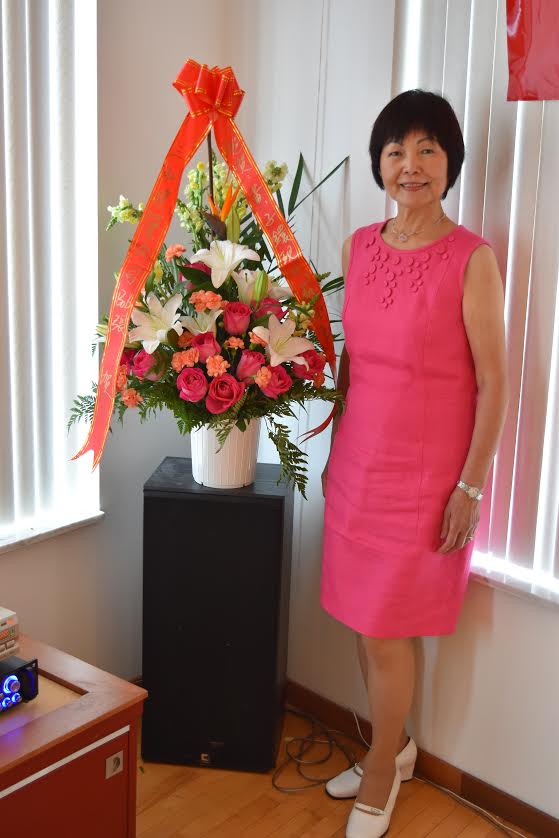
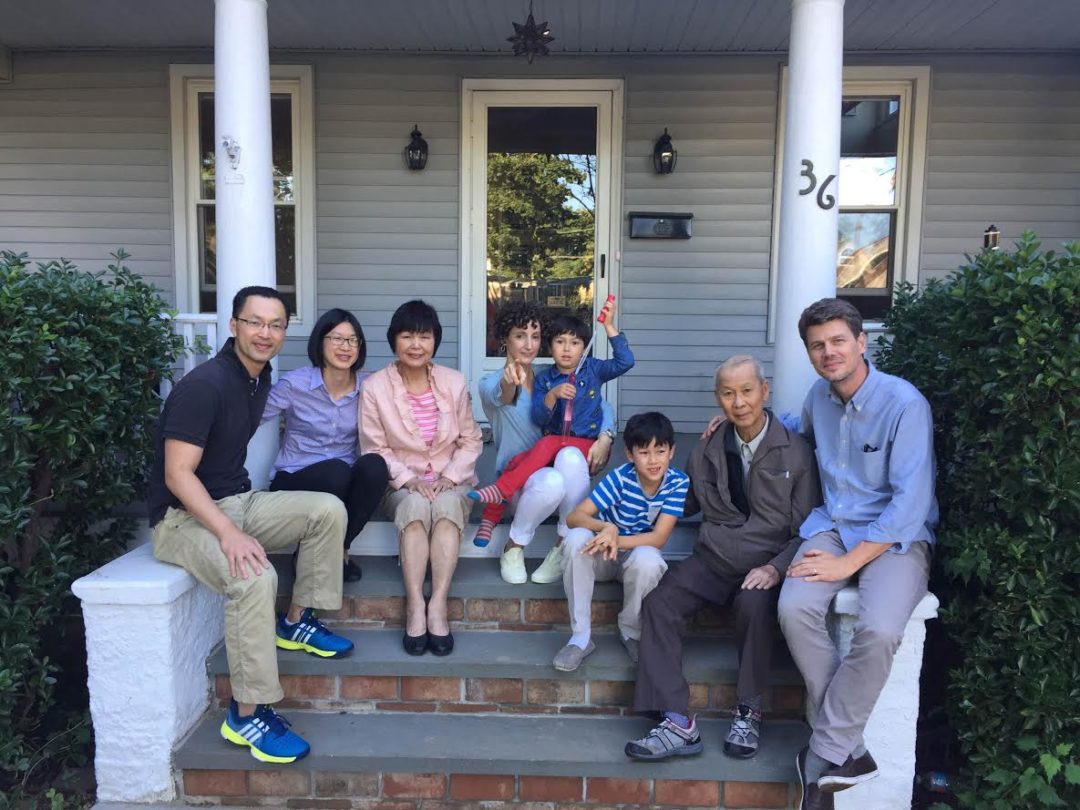
The whole family gathered at author’s daughter’s house
Source from 2015 2015 Federation of North American Hakka Associations 08/2015
Translated from 468. 塞翁失馬 焉知非福 / 楊毓淑 /09/2016 by T.A. Archives
Posted 3/5/2021

